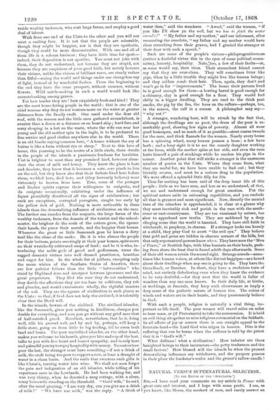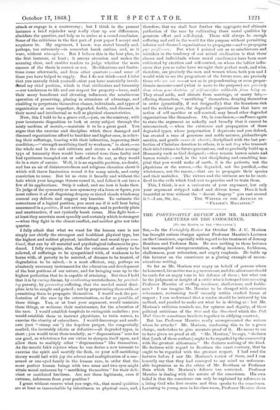NATURAL VERSUS SUPERNATURAL SELECTION.
[TO TRE EDITOR OP THE "SPECTATOR.")
Sitz,—I have read your comments on my article in Fra.cer with great care and interest, and I hope with some profit. I am, as of milk ?" "We have nae milk," was the reply. "A drink of I you know, like Moses, the meekest of men, and rarely answer an attack or engage in a controversy ; but I think in the present instance a brief rejoinder may really clear up our differences, elucidate the question, and help us to arrive at a sound conclusion. Some of the criticisms in the first part of your paper I accept and acquiesce in. My argument, I know, was stated broadly and, perhaps, too extremely—in somewhat harsh outline, and, as it were, without atmosphere. But I believe this is the best plan, in the first instance, at least ; it arrests attention and makes the meaning clear, and enables readers to judge whether the main essence of the thesis is correct or not. Modifications and limita- tions come afterwards, and from other quarters ;—aud sonic of these you have helped to supply. But I do not think—and I infer that you scarcely think yourself—that you have materially invali- dated my chief position, which is that civilization and humanity —our tenderness to life and our respect for property—have, amid their many beneficent and elevating influences, the mischievous operation of preserving, placing in situations of advantage, and enabling to perpetuate themselves classes, individuals, and types of organization at once imperfect, degraded, feeble, and diseased, in their moral and intellectual as well as physical characteristics.
Now, this I hold to be a grave evil,—you, on the contrary, with your inveterate disposition to look at every subject through the misty medium of morals,—maintain it to be a great good. You argue that the exercise and discipline which these damaged and diseased organizations afford to healthier and higher ones, in reliev- ing their sufferings, bearing with their infirmities, improving their condition,—" strength sacrificing itself to weakness," in short,—on the whole and in the end cultivate and create a nobler average type of humanity than would have existed were these faulty and bad specimens trampled out or suffered to die out, as they would do in a state of nature. Well, it is an arguable position, no doubt, and has an air of disinterestedness and religious elevation about it which will throw fascination round it for many minds, and carry conviction to some. But let us state it broadly and without the halo which your language throws round it, and follow it out into a few of its applications. Strip it naked, and see how it looks then. To judge of the symmetry or non-symmetry of a form or figure, you must relieve it of all disguising drapery or tinted clouds which may conceal any defects and suggest any beauties. To estimate the correctness of a logical position, you must see if it will bear being announced in apositive, if not extreme shape, and in perfectly plain and unattractive, if not cynically harsh terms. Men fight best— at least they ascertain most speedily and certainly which is strongest —when they fight in the closest conflict, and neither give nor take quarter.
I fully admit that what we want for the human race is not simply nor chiefly the strongest and healthiest physical type, but the highest and noblest physical, intellectual and moral type com- bined, that can by all material and psychological influences be pro- duced. I fully recognize, also, that the existence of misery to be relieved, of sufferings to be sympathized with, of weakness to be borne with, of poverty to be assisted, of diseases to be treated, of degradation to be raised,—is a most efficient, nay, perhaps an absolutely necessary instrument for the education and development of the best portions of our nature, and for bringing man up to the highest perfection that he is capable of attaining. But then I hold that it is by curing disease, by eradicating wretchedness, by preclud- ing poverty, by preventing suffering, that the needed moral disci- pline is to be sought and gained ; not by perpetuating these evils, or permitting them to propagate themselves. I would seek the per- fectation of the race by the extermination, so far as possible, of these things. You, or at least your argument, would maintain these things, or welcome their maintenance, for the education of the race. I would establish hospitals to extinguish maladies; you would establish them to instruct physicians, to train nurses, to exercise the charity of subscribers. I would discourage and eradi- cate (not "stamp out ") the hopeless pauper, the congenitally morbid, the incurably idiotic or defective—all degraded types, in short ; you would treat them tenderly, as "dispensations" sent for our good, as whetstones for our virtue to sharpen itself upon, and allow them to multiply other " dispensations" like themselves. As the ascetic fakir rejoices when he can devise a new torment to exercise the spirit and mortify the flesh, so your self-sacrificing theory would hail with joy the advent and multiplication of a one- armed or one-eyed family in the human race, in order that the more perfect human beings with two arms and two eyes might attain moral eminence by "sacrificing themselves " for their defi- cient or mutilated brethren. Are not these legitimate, even if extreme, inferences from your position ?
I grant without reserve what you urge, viz., that moral qualities are at least as transmissible by inheritance as physical ones, and,
therefore, that we shall best further the aggregate and ultimate perfection of the race by cultivating those moral qualities by generous effort and self-denial. There will always be enough suffering and evil in the world for this purpose without permitting inferior and diseased organizations to propagate—and to propagate par prefii.ence. But what I pointed out as so mischievous and mistaken in the tendency of our actual civilization is that thos& classes and individuals whose moral excellencies have been most cultivated by exertion and self-control, on whom the loftier influ- ences that you so value have wrought their perfect work, and who, therefore, are precisely the men and women whom both you and I would wish to see the progenitors of the future race, are precisely those who are not so—or not so in preponderating or even propor- tionate measure—and (what is more to the purpose) are precisely those whom your doctrine V self-sacrifice withholds from being so. They stand aside, and abstain from marriage, or marry late,— effacing themselves, " sacrificing " themselves, denying themselves in order (practically, if not designedly) that the luxurious rick and the reckless poor, the degraded organizations that have no notion of self-sacrifice or self-control, may breed other degraded organizations like themselves. Or, in conclusion,—and'once again to state the argument so nakedly and broadly that it cannot be misconceived, — when the existence and propagation of those degraded types, whose perpetuation I deprecate and you defend, has created a race of generous and noble natures, philanthropic ascetics, and gentle meters de charite, disciplined with the last per- fection of Christian devotion to others, it is not they who transmit their tried virtues to future generations, and so gradually build up tt, Humanity such as God designed ; —they remain barren saints and barren vestals ;—and, in the vast disciplining and ennobling hos- pital that you would make of earth, it is the patients, not the physicians or the nurses,—the degraded, not the purifted,—the whetstones, not the razors,—that are to propagate their species and their maladies. The virtues and the virtuous are to be sacri- ficed to the evils which God sent to practise and to train them.
This, I think, is not a caricature of your argument, but only your argument stripped naked and driven home. Does it look beautiful or true without the '• decent drapery" you cast around
it ?—I am, Sir, 84c., TIIE WRITER OF THE ARTICLE IN
" FRASER'S MAGAZINE."



































 Previous page
Previous page